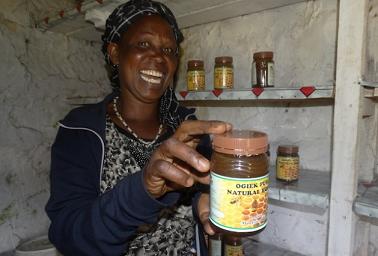
NEWS 2014
Kenya’s
Ogiek Women Conquer Cultural Barriers to Support their Families
Sep 22, 2014

Mary Ondolo, 50, shows a package of honey made by the Ogiek women and packaged and refined by the Mariashoni Community Development, a community-based organisation. Credit: Robert Kibet/IPS
-
Just two years ago, Mary Ondolo, a 50-year-old mother of nine from Kenya’s
marginalised, hunter-gatherer community, the Ogiek, used to live in a grass
thatched, mud house. She’d been living there for decades.
But
thanks to a donation of livestock and equipment she has now been able to send
four of her children local universities and collages and has been able to
build a timber home for her family.
“I
and my husband, apart from our subsistence farming, used to earn extra
income through casual labour,” Ondolo, who is from the small village of
Mariashoni, in the Mau Forest, which lies near Nakuru in Kenya’s Rift
Valley and is about 206 kilometres northwest of Kenya’s capital, Nairobi, told
IPS.
For
decades Ondolo and the women of her community had been denied opportunities,
choices, access to information, education, and skills, which was compounded by
the cultural perception that women are mere
housewives.
According
to the United
Nations Permanent Forum on Indigenous Issues
report, historically, hunter-gatherer communities have been and still remain
the most marginalised sections of society on the continent.
But
two ago, a donation livestock and equipment made to Ondolo and a few other
women in her community, changed their lives by giving them a steady financial
income and, as a result, a role in decision making.
At
the time, Ondolo had been trying to get the other Ogiek women to form groups
in order to pool their resources and rear poultry together.
“It
all started with merry-go-round after I visited one of my friends outside our
locality. And having realised the many problems we women of the minority Ogiek
community origin face, compounded by the deeply-rooted culture and gender
disparity, I mobilised 30 women [in a savings cooperative].
“Members
would put their monthly money contribution into a common pool,” Ondolo
said, adding that members were entitled to borrow loans for as little as Ksh.
500 (five dollars).
Her
idea, which attracted the attention of the Ogiek
Peoples’ Development Programme (OPDP),
a local NGO with close links to the community’s issues, soon led to the
life-changing donation.
“Having
learnt of our organised poultry rearing groups, OPDP in partnership with Kenya
Community Development Foundation [KCDF] helped us start poultry and
beekeeping enterprises,” Ondolo said.
So
in 2012, in the small village of Mariashoni, a group of 80 women gathered at
an open field surrounded by the indigenous Mau Forest to receive improved
indigenous chicks, poultry-rearing equipment and feed.
OPDP
had received about 22,000 dollars in funding from KCDF, which it used to
purchase the livestock and equipment.
Honey-harvesting
equipment and 40 beehives were also given to the Langam Women’s Group and
Ogiek Women’s Empowerment Group. The women were also given skills training.
Ondolo
said that, at first, the women who engaged in beekeeping had to overcome
their own community’s cultural barriers against women earning an income.
But now, she said, they all are major contributors to their families.
“My
husband’s source of income comes from small subsistence farming. But thanks
to the beekeeping project, I have been able to help my husband pay school fees
for our children two are in university and two are in college currently, and
the others are in primary and secondary school,” Ondolo said.
She
is also now a lead member of the Langam Women’s Group.
“Without
any sense of power whatsoever, their participation in decision-making is
minimal, both at home and in the community,” Daniel Kobei, a member of the
OPDP and the Ogiek community, told IPS.
Jane
Rotich, a member of Ogiek Women Beekeeping Empowerment Group agreed.
“Practical and cultural barriers limited the participation of us Ogiek women
in decisions affecting our community, aspects of our public life, as well as
in economic progress and development,” she told IPS.
In
Nessuit location, about 10km from Mariashoni, Agnes Misoi, 30, was also a
beneficiary of the poultry project. She currently owns over 60 chicken, having
sold some to pay for the education of her two high school children.
She
told IPS that prior to the introduction of the poultry project, she
relied mostly on her husband — a subsistence farmer.
“I
no more rely heavily on my husband for basic household needs. In fact, my
husband has numerous times asked for my help financially of which I have been
able to assist,” said Misoi, adding that she normally accumulates about 200
eggs in a month, which she sells for about 24 dollars.
And
her husband, Samuel Misoi, has been grateful for her financial support.
“Nowadays,
[my wife] is the one assisting me during financial difficulties. She
helped me purchase timber for completion of our new house,” he told IPS,
pointing at a three bed-roomed timber house under construction.
Fanis
Inganga, a gender officer with OPDP, told IPS that the project brought great
changes to the Ogiek women’s attitude, as they were now more
confident to work and contribute to the economic and social betterment of
their families and community.
To
maximise profits and lock out brokers, the women only sell their honey to the
Ogiek Beekeepers Association, which is affiliated to Mariashoni Community
Development (MACODEV), a community-based organisation that refines and
packages the honey into a final product.
MACODEV’s
chairman Martin Kiptiony said that the women’s groups have ignited a great
challenge to the men who used to consider themselves as only ones fit to
engage in beekeeping.
However,
poor road network bars the women’s groups from accessing readily-available
markets. Instead they have to sell their packaged honey and poultry products
at public gatherings in the locality. A 250ml tin of Ogiek Pure Honey sells
for three dollars.
Edited
by: Nalisha
Adams
The
writer can be contacted at kibetesq@gmail.com or on twitter @Kibet_88